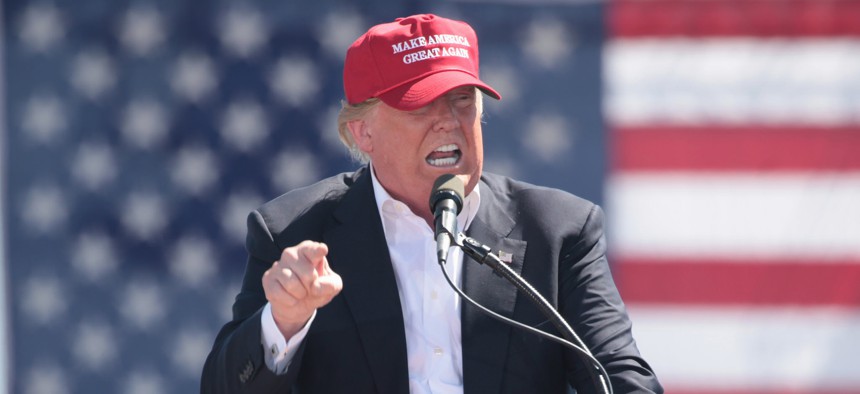
Flickr user Gage Skidmore
Evaluating Trump's Psyche in Public
Inside the ongoing ethics debate over what professionals can say about the president's mental health
It’s not hard to find somebody who’s willing to call the president of the United States crazy. “Madman” was, after all, one of the words that cropped up most frequently in coverage about him during the 2016 campaign.
But psychiatrists, psychologists, and other mental-health professionals have been especially careful about not speculating about the president’s mental state. Well, some of them have been. (It’s not like this question has been left unexplored entirely, however, including in the pages of this magazine.)
But, officially, many psychiatrists and psychologists are cautious, and for good reason. Leading professional organizations like the American Psychiatric Association have underscored the importance of upholding what’s known as the Goldwater Rule, which says psychiatrists should never give opinions about the mental state of individuals they have not directly evaluated. The name refers to a controversy that erupted after the 1964 presidential election, when Senator Barry Goldwater won a libel suit against a magazine that printed the opinion, shared by about 1,000 psychiatrists, that he was mentally unfit for office.
The rule isn’t just about avoiding litigation. Psychiatrists warn that they risk losing patient trust and diminishing the integrity of the profession, by speculating about potential diagnoses or otherwise publicly commenting on a person’s mental health.
Now, with Trump in office, there’s something of a tug-of-war taking place over whether the Goldwater Rule should remain in place. The APA says yes, unequivocally: “It is unethical to offer a professional opinion about an individual without conducting an examination,” the association said in a statement in March. “The complexity of today’s media environment demands that we take special care when speaking publicly about mental health issues, particularly when what we say has the potential to damage not only our professional integrity, but the trust we share with our patients, and their confidence in our abilities as physicians.”
Other groups and individuals, however, aren’t so sure. A president who smashes political norms, it seems, may also be tearing down ethical standards in other realms.
The American Psychoanalytic Association emailed its 3,500 members in July to remind them, in essence, that the Goldwater Rule isn’t part of its ethics code. The association “does not consider political commentary by its individual members an ethical matter,” it said in the email, which a spokesperson for the association forwarded to The Atlantic. Despite the psychoanalytic group’s relatively small size compared with peer organizations, its position is already reigniting debate. It’s also likely to spread some confusion. (It doesn’t help that the American Psychoanalytic Association shares an acronym with the wider known American Psychiatric Association.)
The health website Stat calls it “the first significant crack in the profession’s decades-old united front aimed at preventing experts from discussing the psychiatric aspects of politicians’ behavior.” But the psychiatrist and psychoanalyst Prudence Gourguechon—who says she is a member of both the American Psychiatric Association and the American Psychoanalytic Association—told me the issue is slightly more nuanced.
“We did not tell our members to defy the Goldwater Rule,” she told me on Tuesday. “It’s just that the Goldwater Rule is an American Psychiatric Association rule and each association has its own rules. Our rule at the American Psychoanalytic Association is different.”
“I think we psychoanalysts have enormous and unique insight into human behavior,” she added. “Basically we [at the American Psychoanalytic Association] believe in our members’ free speech and don’t want to prohibit them from speaking out in public. We see Trump’s mental state being discussed and don’t think it’s necessary or right to withold our expertise. ”
That said, the American Psychoanalytic Association does have ethical guidelines for its members, including a set of specific recommendations for how to describe observations about a public official’s behavior.
“Basically you don’t guess what’s going on in somebody’s mind,” Gourguechon told me.
The Goldwater Rule goes further, and says psychiatrists should never comment on the “behavior, symptoms, diagnosis, etc.,” of a public figure without that person’s consent, according to the March statement from the American Psychiatric Association. Even calling the president “impulsive,” for example, “probably breaks the Goldwater Rule,” Gourguechon said.
She gives the example of President Trump’s string of tweets about the television host Mika Brzezinski, calling her “low I.Q.,” and claiming she was “bleeding badly from a face-lift” during party at Trump’s Florida resort on New Year’s Eve.
“I personally am comfortable looking at observable behavior and saying, ‘That was an impulsive act.’ That doesn’t trouble me morally. I think it’s kind of silly to not be able to say. I know that I can confidently say, and I did, that the tweet about Mika Brzezinski showed a lack of discipline and self-control.”
Gourguechon says she and professionals like her should be encouraged to apply what they know to questions about what behavioral patterns make someone a good leader, or not. She’s written about this question, too, including in a recent op-ed for the Los Angeles Times. “The criteria that I identified as essential to responsible leadership, the one I’m most concerned about is the ability to think about the consequences of your actions. First-degree consequences, second-degree consequences, third-degree consequences. I look at [Trump] to see if he really has the capacity to do that. That, to me, is very troublesome.”
Gourguechon stopped herself there.
“I think it’s most useful for me to point out what we should be looking at with him,” she said, “rather than my opinion.”
(Image via Flickr user Gage Skidmore)






